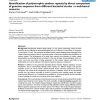Free Online Productivity Tools
i2Speak
i2Symbol
i2OCR
iTex2Img
iWeb2Print
iWeb2Shot
i2Type
iPdf2Split
iPdf2Merge
i2Bopomofo
i2Arabic
i2Style
i2Image
i2PDF
iLatex2Rtf
Sci2ools
BMCBI
2004
2004
Identification of polymorphic tandem repeats by direct comparison of genome sequence from different bacterial strains : a web-ba
Background: Polymorphic tandem repeat typing is a new generic technology which has been proved to be very efficient for bacterial pathogens such as B. anthracis, M. tuberculosis, P. aeruginosa, L. pneumophila, Y. pestis. The previously developed tandem repeats database takes advantage of the release of genome sequence data for a growing number of bacteria to facilitate the identification of tandem repeats. The development of an assay then requires the evaluation of tandem repeat polymorphism on well-selected sets of isolates. In the case of major human pathogens, such as S. aureus, more than one strain is being sequenced, so that tandem repeats most likely to be polymorphic can now be selected in silico based on genome sequence comparison. Results: In addition to the previously described general Tandem Repeats Database, we have developed a tool to automatically identify tandem repeats of a different length in the genome sequence of two (or more) closely related bacterial strains. Geno...
| Added | 16 Dec 2010 |
| Updated | 16 Dec 2010 |
| Type | Journal |
| Year | 2004 |
| Where | BMCBI |
| Authors | France Denoeud, Gilles Vergnaud |
Comments (0)

